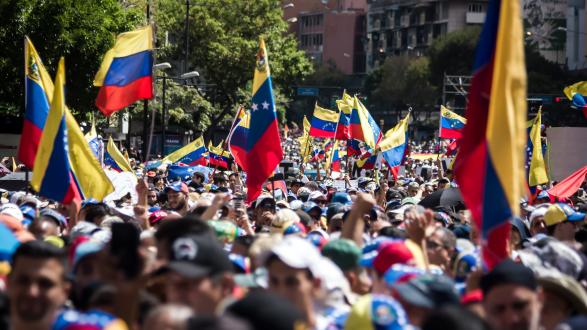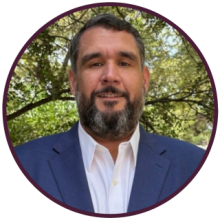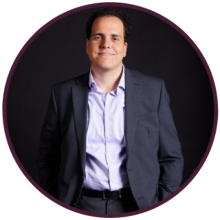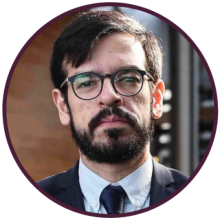Webinar
Join the Pacific Council and Espacio Crítico on Thursday, December 4, at 8 am PT for a conversation exploring how Venezuela’s criminal authoritarian system operates, what democratic strategies are at stake, and how U.S. and regional policies can be aligned to support democratic resilience. Attendees will hear from Ronna Rísquez, Investigative Journalist & Author, Dr. Juan Miguel Matheus, Congressman of the National Assembly of Venezuela, Pedro Urruchurtu Noselli, International Relations Coordinator for María Corina Machado, Edmundo González Urrutia, and the ConVzla Campaign, and Miguel Pizarro, Director of Espacio Crítico.
In recent years, Venezuela has consolidated a power model that combines authoritarian elements with the systematic use of illicit networks as instruments of territorial, economic, and political control. This system relies on criminal organizations like Tren de Aragua and the Cartel of the Suns. In response, democratic opposition leaders such as Edmundo González Urrutia and María Corina Machado have denounced the regime’s criminal nature and have articulated a narrative centered on democracy and the rule of law. A recent U.S. policy shift targeting transnational crime linked to the Maduro government, alongside growing civil-society efforts to protect civic space, marks a pivotal moment for regional stability and democratic resilience.
Why it’s important:
- President Donald Trump said he would not rule out sending U.S. troops to Venezuela, as the expanding U.S. military presence in the region further fuels speculation about possible military intervention in the country.
- The U.S. State Department stated that Cartel de los Soles will be designated a terrorist organization.
- The Trump administration is increasing its pressure campaign against Venezuela by placing an aircraft carrier in the Caribbean.
Please send questions in advance to events@pacificcouncil.org.
To register for this webinar, visit the Zoom Registration Page.
Guest Speaker
Dr. Juan Miguel Matheus is a Venezuelan constitutional lawyer, political leader, and public intellectual committed to the defense of democracy, human rights, the rule of law, robust freedom of speech, and the right of political dissent. Throughout his career, he has intentionally combined intellectual life with practical action—bridging legal scholarship, civic education, and political engagement—and dedicating himself to forming new generations of civic leaders.
As a Member of the National Assembly since 2015, Juan Miguel served as Head of the Parliamentary Group of Primero Justicia, the main opposition party in Venezuela. He currently serves as Coordinator of its National Executive Board, working from exile to lead the party’s strategic direction and strengthen its role as a democratic alternative to authoritarianism.
Juan Miguel holds a Ph.D. in Constitutional and Parliamentary Law from the University of Navarre and has carried out academic work at Stanford Law School, Georgetown University, and the University of Texas School of Law, where he currently works as Senior Research Fellow for the Bech-Loughlin First Amendment Center of the United States Constitution.
He is the founder of FORMA Institute, where for over 25 years he has directed a school of civic leadership committed to empowering youth and emerging leaders with the values, skills, and civic imagination necessary to serve the public and strengthen democratic institutions. Juan Miguel also serves as co-editor of Democratization, a journal on democratic transformation published by FORMA’s Institute for Political and Social Studies.
Having witnessed Venezuela’s institutional collapse firsthand, Juan Miguel knows from personal experience that when a nation loses its culture of justice and freedom, even the strongest democracies can fall prey to populism and authoritarianism. For him, public service is a moral calling. He believes the renewal of democracy begins by cultivating civic imagination, empowering citizens—and especially new generations—to participate freely and responsibly in public life.
All of his work is inspired and guided by the principles of natural law and ethics, which he believes are essential foundations for a just society and authentic human dignity.
Guest Speaker
Ronna Rísquez is an investigative journalist from Venezuela. For more than 20 years, she has reported on organized crime, prisons, citizen security, migration, and human rights.
Her revealing reports on gangs, drug trafficking, and police violence have exposed her country's criminal dynamics and links to political power. Her work has been recognized with the Premio Rey de España (The King of Spain Prize) and other journalistic awards such as the Gabriel García Márquez Award, the Global Shining Light Award, and the Javier Valdez Award.
Ronna is also the author of the book El Tren de Aragua: La banda que revoluciona el crimen organizado en América Latina (The Aragua Train: The Gang Revolutionizing Organized Crime in Latin America). This journalistic piece is the result of more than five years of research. It uncovers the existence of a Venezuelan prison gang that expanded to several countries in the Americas and later became the center of anti-immigrant discourse and the narrative against drug cartels in the current Donald Trump administration.
Her book is used as a reference text by experts, academics, and researchers in Latin America and the United States, and is an example of investigative journalism in the region.
Ronna also participated in the Panama Papers investigation. She currently coordinates the Alianza Rebelde Investiga (ARI), an editorial coalition comprised of Venezuelan digital media outlets Runrun.es, El Pitazo, and TalCual. She is also the editor of Monitor de Víctimas, a platform that records data on violence.
She holds a degree in Social Communication from the Central University of Venezuela. She was a fellow in the journalism and trauma program at the Dart Center at Columbia University. She participated in the Drug Policy and Human Rights diploma program at CIDE, Mexico, and in the Martin Baron workshop for editors at Connectas.
Guest Speaker
Pedro Urruchurtu Noselli is a Venezuelan activist, political scientist, and university professor. He currently serves as the International Relations Coordinator in the office of opposition leader María Corina Machado, of President-elect Edmundo González Urrutia, and of the ConVzla campaign—a role that led to his political persecution by the Venezuelan regime.
As a consequence, he was forced to seek asylum at the Argentine Embassy in Caracas, where he was held hostage by the regime for more than 400 days, until he was rescued in a precise and remarkable international operation led by the United States. From within the embassy, and despite the constant siege he faced, Urruchurtu successfully managed the campaign’s international relations, maintaining contact with governments, foreign ministries, parliaments, political and civil society organizations, and allies of the Venezuelan democratic cause.
He also serves as the International Affairs Coordinator for Vente Venezuela and as Coordinator for Political Parties within the Liberal Network of Latin America (RELIAL), where he previously held the position of Vice President. Additionally, he is a graduate of Georgetown University’s Global Competitiveness Leadership Program. He earned his Bachelor’s degree in Political Science, with a concentration in International Relations, from the School of Political and Administrative Studies at the Central University of Venezuela, graduating Magna Cum Laude.
Urruchurtu has played a key role in the fight against Venezuela’s tyranny, shaping the international strategy that has exposed the regime’s abuses and mobilized decisive support for the democratic cause. Even during his political captivity, he continued to lead the opposition’s international relations, becoming a symbol of civic resistance and commitment to freedom. He has published numerous opinion pieces and co-authored several books on geopolitics, China’s influence in Latin America, leadership, and liberal democracy. He has also contributed to the training of young leaders in areas such as democracy, leadership, international relations, and human rights, helping to empower a new generation committed to freedom.
Moderator
Miguel Pizarro is a Venezuelan activist with extensive experience in human rights, international advocacy, and strengthening civil society in contexts of democratic backsliding. Throughout his career, he has worked closely with civil society organizations, multilateral bodies, governments, cooperation agencies, and international organizations to raise awareness of the Venezuelan crisis, promote the protection of fundamental rights, and seek solutions to the humanitarian emergency.
He was elected deputy to the National Assembly of Venezuela in 2010, at the age of 21, and was re-elected in 2015, representing one of the largest popular neighborhoods (barrios) in Latin America. Since 2019, he has held various positions as a representative to the United Nations (UN) and in the area of foreign relations.
His experience in international coordination has been key to promoting measures against those responsible for human rights violations, channeling humanitarian aid, and advancing accountability mechanisms in forums such as the UN, the Organization of American States, and the International Criminal Court. He has actively participated in the drafting and follow-up of resolutions on Venezuela at the UN Human Rights Council, as well as in monitoring initiatives linked to the humanitarian emergency and the progressive shrinking of civic space in the country.
His experience in advocacy, political strategy, and international cooperation has made him a central figure in the fight against authoritarianism and in the search for solutions in crisis contexts.
To register for this webinar, visit the Zoom Registration Page.








